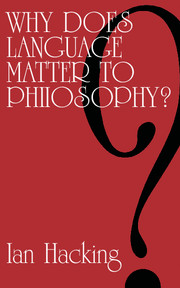8 - Ludwig Wittgenstein's articulation
Published online by Cambridge University Press: 05 November 2012
Summary
Russell was convinced that he had discovered that logical form differs from grammatical form. ‘The king of France is bald’ is a sentence whose grammatical form appears to be: [Subject (The king of France)] + [Predicate (is bald)]. But the logical form is a conjunction of three sentences, none of which is in subject–predicate form: there is at least one king of France, there is at most one, and every king of France is bald. This notion of logical form needs a good deal of elucidation.
A deductive argument is called valid if the conclusion follows from the premises. (This is a technical use of the term ‘valid’. In common speech, a valid argument is often simply a persuasive argument. An argument can fail to be rationally persuasive for two distinct reasons: it may be invalid, or the premises may not all be known to be true. Validity, in the jargon of logicians, has to do with deductive consequence, not soundness of the premises.) It is commonly held that a deductive argument, if valid, is valid in virtue of its form, not its content. Thus, ‘All my teachers are men, all men are mortal, so all my teachers are mortal’ is not valid in virtue of anything about male teachers; validity has to do with the form ‘all A are B, all B are C, so all A are C’. Logicians from Aristotle on have drawn up schemes of valid argument. An argument whose premises and conclusion have the forms of the steps in a valid argument scheme, it itself a valid argument.
- Type
- Chapter
- Information
- Why Does Language Matter to Philosophy? , pp. 82 - 92Publisher: Cambridge University PressPrint publication year: 1975



